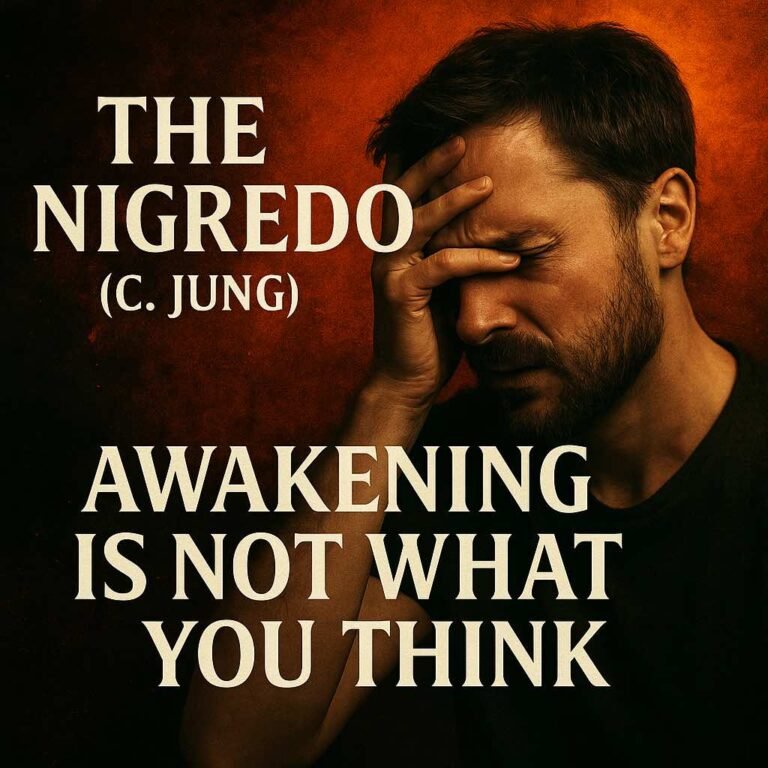
August 24, 2025
Coach G
No Comments
Awakening. The word itself sounds luminous, doesn’t it? Like a sudden burst of light, a revelation, a transcendence into some higher state of being.
It’s absolutely romanticized in spiritual circles, painted as a moment of cosmic clarity where the self dissolves into bliss, and all is well. But for those who have walked the path, truly walked it, awakening is not always a gentle unfolding. Sometimes, well, it’s a descent into the abyss, a confrontation with the raw, unfiltered truth of your own psyche.
Carl Jung, the well-known Swiss psychiatrist who mapped the terrain of the soul like few others, called this initial stage of transformation the “Nigredo“, the blackening, the putrefaction, the death of the old self. It’s a process that strips you bare, annihilates the ego, and leaves you grappling with questions you didn’t even know you had.
This is my story of awakening, of plunging into the Nigredo, and the hard-earned lessons I’ve gathered along the way, lessons about premature awakening, the lack of a roadmap, and the grueling work of rebuilding a self after the old one has been shattered.
My journey into awakening wasn’t planned. It wasn’t something I sought out with incense, meditation cushions, or a guru’s blessing. It came unbidden, like a storm rolling in over a calm sea. I was in my late twenties, living what I thought was a “normal” life, successful business, a small circle of friends, a quite predictable routine. But beneath the surface, there was a restlessness, a vague sense that something was missing.
I ignored it for years, papering over the cracks with distractions. Then, one ordinary day, it happened. The boundaries of “me” felt porous, as if I were dissolving into the air around me. For a fleeting moment, I felt connected to everything, every person, every blade of grass, every star in the sky. It was ecstatic, overwhelming, not even terrifying, more like remembering something that always was evident but hidden from my sight.
That moment was the spark. I didn’t know it then, but it was the beginning of my awakening, and the descent into what Jung would call the Nigredo. I thought I was on the cusp of something glorious, a spiritual breakthrough that would elevate me above the mundane. I was wrong. What followed wasn’t bliss. It was pure chaos.
In Jungian psychology, the Nigredo is the first stage of the alchemical process of transformation. It’s the “blackening,” the phase where the raw material of the self, your ego, your beliefs, your identity, is broken down, dissolved, and confronted with its shadow.
Jung saw alchemy as a metaphor for the individuation process, the journey toward wholeness, and the Nigredo is where it all begins. It’s not a gentle unraveling but a brutal dismantling. Imagine your sense of self as a house you’ve lived in your whole life, only to discover it’s built on sand. The Nigredo is the storm that tears it down, leaving you exposed to the elements.
For me, the Nigredo began with a flood of existential questions. Who am I? What is real? Why am I here? These weren’t philosophical musings I could easily ponder over coffee. They were relentless, gnawing at me day and night. The world I’d known, the one where I went to work, paid bills, and planned for the future, started to feel like a flimsy illusory construct. My job, which I’d once found satisfying, became a hollow ritual. Relationships that had anchored me began to fray as I struggled to explain what was happening inside me. I felt like I was losing my grip on reality, and in a way, I was…
The Nigredo is not just an intellectual crisis; it’s visceral. I experienced physical symptoms, insomnia, heart palpitations, a constant knot in my stomach. My mind became a battleground, flooded with images and emotions I couldn’t control. Jung described the Nigredo as a confrontation with the shadow, the unconscious parts of ourselves we’d rather ignore, our fears, shame, repressed desires.
For me, this meant facing the parts of myself I’d buried: my insecurities, my need for approval, my fears, plural and hidden. It was like staring into a mirror that showed not just my face but every hidden wound, every lie I’d told myself to keep going.
The Danger of Premature Awakening
One of the greatest dangers of awakening is that it can come too soon. Jung warned that the psyche must be ready for the alchemical process, that forcing or rushing individuation can lead to psychological fragmentation.
In spiritual communities, there’s a tendency to glorify awakening as a one-size-fits-all path to enlightenment, but Jung’s insights, and my own experience, suggest otherwise. An awakening that comes before you’ve built a strong enough ego to withstand the Nigredo can be catastrophic. It’s like throwing a child into the deep end of a pool before they’ve learned to swim.
I probably wasn’t ready though there was no way back. My ego, though functional in the context of my old life, was fragile. It was built on external validations, career success, social approval, the illusion of control. When the awakening hit, it shattered that foundation. I had no tools to navigate the chaos, no framework to make sense of the dissolution.
I briefly tried to cling to my old life, to “go back to normal,” but that was impossible. The veil had been lifted, and there was no unseeing what I’d seen. I spent months oscillating between euphoria and despair, chasing fleeting moments of transcendence while drowning in existential dread.
This is the warning I wish I’d heard: awakening is not a shortcut to bliss. It’s a reckoning. If you’re not prepared, if your psyche hasn’t developed the resilience to face the shadow, you risk being consumed by the process. Jung emphasized the importance of a stable ego before diving into the unconscious, and I understand why.
Without that anchor, you’re adrift in a sea of archetypes, emotions, and revelations that can overwhelm you.
No Roadmap, Only the Path
Another harsh truth about awakening is that there’s no roadmap.
Spiritual traditions offer practices (meditation, yoga, prayer) but these are tools, not blueprints. Jung’s work provides a framework for understanding the process, but even he couldn’t prescribe a step-by-step guide. The Nigredo, and the stages that follow (Albedo, Citrinitas, Rubedo), are not linear. They’re cyclical, unpredictable, and deeply personal. What works for one person may be useless for another.
For me, this lack of direction was maddening. I wanted answers, a clear path forward, but all I found was more questions. I tried everything to make sense of it. Some of what I found was helpful, Jung’s concept of the shadow gave me language for what I was experiencing, and meditation helped me sit with the discomfort, but nothing offered a quick fix.
The Nigredo demanded patience, surrender, and a willingness to sit in the dark without knowing when the light would come. I had to learn to trust the process, even when it felt like I was falling apart.
Ego Annihilation and the Long Road to Soul Motivation
The most brutal aspect of the Nigredo is the annihilation of the ego. Jung described the ego as the center of conscious awareness, the “I” that navigates the world. In awakening, that “I” is dismantled, exposed as a fragile construct built on illusions. For me, this felt like losing myself entirely. The person I’d been, the one who had goals, ambitions, a clear sense of identity, was gone.
In its place was a void, a terrifying emptiness that made me question whether I’d ever find solid ground again. This is where the myth of awakening as instant bliss falls apart. The Nigredo is not a weekend retreat or a psychedelic trip. It’s a process that can take years, even decades. For me, it was a slow, painful unraveling. I spent years wrestling with the fragments of my old self, trying to piece together a new one. I mourned the life I’d lost, the simplicity of not knowing. I tried to go backwards at the beginning but it was like trying to wear clothes that no longer fit. The world had changed, or maybe I had, and there was no going back.
What kept me going was what Jung called “soul motivation”, the deep, inner drive to become whole, to integrate the shadow and the light. But this motivation didn’t kick in right away. For a long time, I was stuck in survival mode, just trying to make it through each day. The soul’s call is quiet, subtle, and it requires you to listen closely.
It took years of work before I began to hear it. Even then, it wasn’t a triumphant moment. It was a slow dawning, a realization that the only way out was through.
The process keeps on going. The Nigredo doesn’t end cleanly at all; it bleeds into the next stages of transformation, leaving scars that never fully heal. But it also leaves gifts. I’ve learned to sit with uncertainty, to embrace the unknown without needing to control it. I’ve developed a deeper compassion for myself and others, a recognition that we’re all carrying unseen burdens. And I’ve glimpsed something greater, lodged within, a profound sense of interconnectedness that gives meaning to the chaos.
If you’re on the cusp of awakening, or if you’re already in the thick of it, here’s what I’d tell you: be gentle with yourself. The Nigredo is not a punishment; it’s a crucible. It’s the fire that burns away what no longer serves you, but it hurts like hell. Don’t rush it. Don’t try to force bliss or transcendence. And don’t expect a roadmap, though those who wentthrough it can help and hold the Light to a certain extent.
The path is yours alone, and it will unfold in its own time. Surround yourself with people who can hold space for you, who won’t try to fix you or push you toward premature enlightenment. Seek out tools, Jung’s work, coaching, therapy, creative expression, whatever can help you navigate the darkness. And above all, trust that the process is leading you somewhere, even if you can’t see it yet. But trust me, it will…
Share:
Categories
Popular Posts
Tags
Book Summary
Coach G
Coaching
consciousness
ego
Emotional Healing
Emotional Intelligence
Emotional Resilience
empowerment
faith
forgiveness
Growth Mindset
healing
Inner Peace
law of attraction
letting go
life coach
life coach Dubai
Life Coaching
Life Coaching Dubai
Manifestation
marriage
Mental Health
Mindfulness
Mindset Shift
oneness
Personal Development
personal growth
Personal Transformation
Positive Mindset
productivity
quantum psychology
relationships
Resilience
Self-Awareness
Self-Discovery
Self-Improvement
Spiritual Awakening
spiritual coach
spiritual growth
spirituality
Success Mindset
Time Management
Transformation
Universal Laws
© 2026 Coach G Dubai. All rights reserved.




